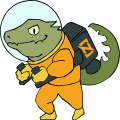This article needs additional citations for verification .(July 2023) |

This is a list of computing mascots. A mascot is any person, animal, or object thought to bring luck, or anything used to represent a group with a common public identity. In case of computing mascots, they either represent software, hardware, or any project or collective entity behind them.
Contents
Within collaborative software projects, the use of mascots often allow for the existence of a non-trademarked symbol for use by the software's community, as opposed to Logos and Wordmarks, which often have more stringent protections. [1]
| Mascot | Representing | Description | Image | Ref(s) | |||
|---|---|---|---|---|---|---|---|
| Adiumy | Adium, a free and open-source instant messaging client for macOS. | A cartoon duck | 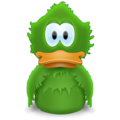 | [2] | |||
| Amanda the Panda | Window Maker, a free and open-source window manager for the X Window System. | A cartoon panda |  | [3] [4] | |||
| Apache Beam Firefly | Apache Beam | A cartoon firefly |  | [5] [6] | |||
| Beanbird | LG’s webOS operating system | A brown bean shaped bird | 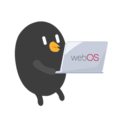 | [7] | |||
| Blinky | FreeDOS, a free and open-source DOS implementation for IBM PC compatible computers. | A cartoon fish |  | [8] | |||
| Beastie, the BSD Daemon | BSD, a free and open-source Unix operating system derivative that also has many derivations out of itself. | A cartoon demon |  | [9] | |||
| The Bot/Bugdroid [a] | Android operating system | A green cartoon android robot |  | [10] [11] [12] [13] | |||
| Buggie | SerenityOS, a free and open-source desktop operating system | A cartoon anthropomorphic ladybug |  | [14] | |||
| Buggie | Bugzilla, a free and open-source web-based general-purpose bugtracker and testing tool | A cartoon anthropomorphic bug | 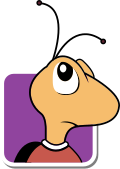 | [15] | |||
| Camelia | Raku | A cartoon bug with butterfly-like wings |  | [16] | |||
| Keith [b] | C++ | An obese, diseased rat with a missing hind leg |  | [17] | |||
| Canteloupe | Libreboot | The silhouette of an antelope, leaping | 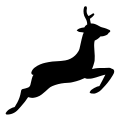 | [18] | |||
| CowDuck | TerminusDB | A cartoon hybrid with the head of a cow and the body of a duck |  | [19] | |||
| Dash | Dart language and the Flutter framework. | A hummingbird. It represents Dart as a fast language. |  | [20] | |||
| DotNet Bot [c] | .NET free and open source software framework | A purple robot, waving |  | [21] | |||
| Duke | Java, a system for developing application software and deploying it in a cross-platform computing environment | A stylized, unspecified creature |  | [22] [1] | |||
| D-Man | D, is a multi-paradigm system programming language. | A letter D anthropomorphized with humanlike limbs and a set of eyes |  | [23] | |||
| elePHPant | PHP, a server-side scripting language designed primarily for web development | A cartoon elephant |  | [24] | |||
| eMule | eMule, a free and open-source peer-to-peer file sharing application for Microsoft Windows | A cartoon mule |  | [25] | |||
| Freedo | Linux-libre, a free and open-source operating system kernel derived from Linux kernel, packaged by GNU to have all the proprietary components removed | A cartoon anthropomorphic penguin | 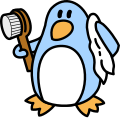 | [26] | |||
| Ferris [b] | Rust language | A cartoon crab |  | [27] | |||
| Gavroche | GNU MediaGoblin, a free and open-source decentralized server software for hosting and sharing digital media | A cartoon goblin |  | [28] | |||
| Geeko | SUSE Linux, a Linux-based free and open-source computer operating system family | A stylized chameleon |  | [29] | |||
| Glenda, the Plan 9 Bunny | Plan 9 from Bell Labs, a free and open-source distributed operating system that manages all computing resources through its file system rather than specialized interfaces | A cartoon rabbit |  | [30] | |||
| GNU [d] | GNU, a free and open-source operating system and an extensive collection of computer software; it is also the mascot of GNU Project, a free-software, mass-collaboration project | An anthropomorphic wildebeest head | 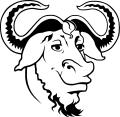 | [31] | |||
| The mascots associated with the Godot Engine, a free and open-source, cross-platform game engine. The primary symbol is the stylized Godot logo, which serves as the basis for various character designs. These include Gbot (also known as Gobot or GDbot), an anthropomorphic robot with a Godot logo-shaped head, and part of the same mascot line as Godette and Sophia. Godette is an anime-style female mascot inspired by the logo's features, and Sophia is artist Tyson Tan's reinterpretation of Godette in the tradition of OS-tan or anime-tan software mascots. A Godot plush toy, modeled after the logo, exists in both 2D and 3D forms and is often featured in Godot-based games. | A stylized blue robot head with a gear-shaped outline serves as the base design across all variants. | Godot Logo Godette GDBot and Sophia Godot Robot Plush | [32] [33] [34] | |||
| Gooey | WebGUI, a free and open-source content management system | A cartoon octopus |  | [40] | |||
| Go Gopher | Go, free and open-source programming language | A cartoon gopher |  | [41] | |||
| Hexley | Darwin | A cartoon platypus |  | [42] | |||
| Kandalf | Formerly KDE | A cartoon wizard |  | [43] | |||
| Kate the Cyber Woodpecker | Kate, a free and open-source advanced text editor for software developers | A cartoon robotic woodpecker |  | [44] | |||
| Kiki the Cyber Squirrel | Krita, a free and open-source raster graphics editor designed for digital painting and animation | A cartoon anthropomorphic robotic squirrel |  | [45] | |||
| Kitty | AROS Research Operating System, a free and open-source multimedia centric implementation of the AmigaOS 3.1 APIs | A cartoon anthropomorphic cat, created by Eric W. Schwartz |  | [46] | |||
| Konqi ( Katie and KDE dragons ) | The primary mascot of KDE, an international community that develops free and open-source software, and KDE Projects, software they have developed, including KDE Plasma workspace, KDE Frameworks, and the software foundation of other KDE Applications. A number of other dragons also exist, such as Katie, associated with KDE Women's Project and KDE dragons, the mascots of KDE Community | Cartoon dragons |
| [43] | |||
| Kodee | Kotlin programming language | A stylized robot |  | [47] | |||
| Lenny | Lubuntu | A penguin with blue hair |  | [48] | |||
| Larry [b] | Gentoo Linux | A crudely drawn cow |  | [49] | |||
| The Lisp alien | Lisp | A quadruped alien with more than four eyes and a single arm extending from the nose |  | [50] | |||
| Lucy | Gleam programming language | A pink starfish |  | [51] | |||
| Moby Dock | Docker, a set of platform as a service (PaaS) products | A cartoon whale that hauls shipping containers on its back |  | [52] | |||
| Mozilla | Retired mascot of Mozilla Foundation, a non-profit organization that supports and leads Mozilla, a free-software community that developed Firefox, a free and open-source web browser and many related projects. | A cartoon anthropomorphic lizard and later a stylized tyrannosaurus rex |  | [53] | |||
| Octocat | GitHub | An anthropomorphized cat with five octopus-like arms |  | [54] [55] | |||
| Apache Pig | Apache Pig | An anthropomorphic pig |  | [56] | |||
| Pony | Pony programming language | A cartoon pony |  | [57] | |||
| Preston | PrestaShop, a free and open-source e-commerce platform. | A puffin |  | [58] [59] | |||
| Puffy | OpenBSD, a free and open-source Unix-like operating system descended from BSD, dedicated to security and stability features | A cartoon pufferfish | 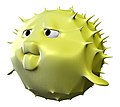 | [60] | |||
| Purple Pidgin | Pidgin, a free and open-source multi-platform instant messaging client | A cartoon pigeon |  | [61] | |||
| Powershell Hero | Microsoft Powershell 7, Microsoft's open-source shell | A flat shaded humanoid character |  | [62] | |||
| Camel | Perl, a high-level programming language | A camel | [63] | ||||
| Log Raft | Raft consensus algorithm | A log raft with a face. Created by Andrea Ruygt, and made a vector by Diego Ongaro |  | [64] | |||
| Rocky Raccoon | MINIX 3, a free and open-source project to create a small, high availability, high functioning Unix-like operating system | A cartoon raccoon |  | [65] | |||
| Sakila | MySQL | A stylized dolphin | [66] | ||||
| Sara | OpenGameArt.org | A pixel art girl with blonde hair |  | [67] | |||
| Scratch Cat | Scratch | A cartoon anthropomorphic orange cat [e] | [69] | ||||
| Slonik | Postgresql | A stylised elephant |  | [70] | |||
| Sudo Sandwich | Sudo | A smiling sandwich |  | [71] | |||
| Suzanne | Blender | A monkey head |  | [72] | |||
| Syft | Syft, free and open-source software bill-of-materials command-line tool and Go library | A cute cartoon owl |  | [73] | |||
| Tux | Linux kernel, a free and open-source monolithic Unix-like computer operating system kernel that has been included in many OS distributions | A cartoon anthropomorphic penguin |  | [74] [1] | |||
| Tizen Genie | former mascot of the Tizen operating system for phones | Genie |  | [75] [76] | |||
| Veasel | V programming language | A cartoon weasel |  | [77] | |||
| Wilber | GIMP, a free and open-source raster graphics editor designed for image editing, drawing, image format conversion and others | A creature similar to a Fox or a dog, but is officially a fictional species called a "GIMP" | 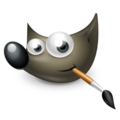 | [78] [79] [80] | |||
| Wizard | ImageMagick, a free and open-source cross-platform software suite for displaying, creating, converting, modifying, and editing raster images | A wizard |  | [81] | |||
| Various Wombats | DATATRIEVE, being adopted as the mascot of its product group. References were included in the help system for the product, and a graphics demonstration using the "PLOT WOMBAT" command displays the character. | [82] | |||||
| Wyvern | LLVM, a set of compiler and toolchain technologies that can be used to develop a compiler frontend for any programming language and backend for any instruction set architecture. | A stylized wyvern | [83] | ||||
| Xue | Xfce, a free and open-source desktop environment for Unix-like operating systems that aims to be fast and lightweight, while still being visually appealing and easy to use | A stylized mouse |  | [84] | |||
| Zero the Ziguana Ziggy the Ziguana and Carmen the Allocgator | Zig programming language | Cartoon anthropomorphic iguana and alligator |
| [85] | |||
| Znurt the Flying Saucer [b] | Gentoo Linux | A stylized purple flying saucer |  | [49] | |||
| Pygame snake [b] | Pygame, a free and open-source Python library for game development | A snake holding a gaming controller | | No ref available |





